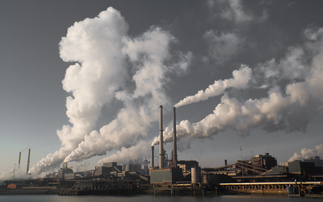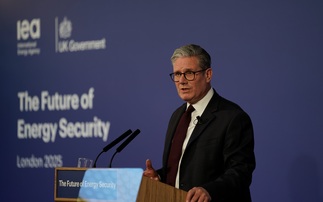The London Mayoral campaign has been divisive and brutish, and admirable green policies risk becoming collateral damage
The London mayoral campaign should have been remembered as the greenest election in British political history.
Everything was in alignment: a life-long environmentalist as the Conservative candidate; a Labour candidate proposing to pedestrianise Oxford Street and bring clean energy to Londoners; popular Green and Lib Dem candidates pushing the front-runners to be more ambitious still on environmental issues; and, most important of all, a voting population that saw air quality as a top priority, alongside related environmental issues such as housing and public transport.
Add in the fact that all the candidates represented a change from an increasingly distracted incumbent with a track record of bizarre pronouncements on climate change in the form of Boris ‘four jobs' Johnson, and there was a huge opportunity for the environment to take centre stage during this campaign. The failure of our columnist/historical biographer/Member of Parliament/Vote Leave spokesman/Mayor to build on the early promise of his Boris Bikes, the slow progress on tackling toxic air pollution, the kicking into the long grass of crucial decisions on the next phase of the Congestion Charge and much needed new transport infrastructure, and London's scandalously low rate of clean energy deployment offered those bidding to take up the reins at City Hall the chance to put forward a positive and exciting green vision.
In fairness, the candidates have, on occasions, tried to present such a vision. But if this election is remembered for anything it will be for the remarkable nastiness of a campaign that has exploded into thinly veiled, and at times explicit, accusations of racism, intolerance, extremism, and dog-whistle electioneering. It has been a singularly depressing experience to watch and regardless of the rights and wrongs of a campaign that has seen faults on all sides there is little doubt reputations have been tarnished.
This is not the place to rake over the allegations about the controversial Conservative tactic of sending racially profiled leaflets or address how justified it is to question the suitability of a candidate based on the repellent views of people they have met or even worked with.
However, there are a couple of issues raised by the London mayoral campaign that are relevant to green businesses and campaigners.
George Monbiot has argued in the past it will be impossible to deliver an adequate political response to climate change until we get political funding reform that forces big money out of the electoral process and frees politicians from the paymasters who currently bankroll their campaigns. He may well have a point, but it is equally true that alongside any political funding reform we also need some cultural reform. Politics has always been a rough trade and there never were any 'good old days' when political opponents debated in an atmosphere of dignified mutual respect. But the coarsening of the political culture the UK is in the process of importing from the US and Australia feels like something new and worrying.
And it is particularly concerning for those issues, such as the environment and climate change (not to mention tackling the cancer of racism in our society), which urgently need long term political co-operation if they are to be resolved.
The problem is that the scorched earth campaigning approach that paints your opponent as a "real danger" to their own city makes post-election governance extremely challenging for whoever wins.
We got a taste of this last year when the Conservatives ran a general election campaign that was staggeringly low on policy detail and remarkably high on vitriolic attacks that sought to characterise opponents as a threat to national security. In the field of energy policy, the Conservatives were thus able to accuse Labour of wanting to push up energy bills, while repeatedly refusing to explain how they would meet the environmental and climate goals they too had signed up for. The net result has been a remarkably confusing year for the energy sector as Ministers have sought to pull together a detailed programme for government on the fly - a programme that seeks to build on the idea that the opposition is reprehensibly profligate, while pretty much agreeing with them on the urgent need for new investment and emissions reductions. You can see similar confusion around health and education policy finally breaking into the media spotlight in recent weeks.
The tenor of the London Mayoral campaign with its sordid accusations of racism and extremism threatens to create an even more challenging climate for the eventual winner.
If Zac Goldsmith defies the polls and pulls off a shock win the challenges will be less acute, even if Number 10 will quickly have to reconcile itself to a London Mayor who is, if anything, even more Eurosceptic and implacably opposed to Heathrow expansion than the last.
But if Sadiq Khan wins he walks straight into a series of battles with a government where senior Ministers have signed up fully to campaign tactics that accuse him of being a danger to the city he calls home. The Prime Minister has said Londoners would become lab rats for a Corbynista experiment, and with Khan elected he would have to explain more clearly what he means.
The risk is that perfectly sensible environmental proposals from the new Mayor for bolder action on air quality, green buildings, or clean energy, could be characterised as 'radical' and 'experimental' by a government reluctant to let go of its campaign narrative. Policies that command cross party backing - and for all the sound and fury of the campaign, Khan and Goldsmith are on pretty much the same page on a host of environmental and clean tech issues - risk becoming collateral damage in the increasingly toxic and partisan battle between the two main parties, a battle which Labour is also seeking to escalate this week with the unveiling yesterday of its willfully divisive election poster.
As Matthew Parris argued in The Times this weekend, if the government wins the EU referendum a rump of disaffected rebels will make it their life's mission to destabilise the Prime Minister. He will likely need help from other parties to get legislation passed, necessitating a return to the kind of cross-party co-operation that underpinned the coalition. And yet, there is scant evidence of any willingness on the part of the sensible centrists in all parties who would make such co-operation work to reassert themselves. Currently, the head-bangers appear to be in charge.
As always there are reasons to remain hopeful. Whoever replaces Mayor Boris is likely to be more engaged with the task of protecting London's air and green spaces while nurturing the capital's green business potential - after all, they could hardly be less engaged. Both the leading candidates have ambitious policies on clean energy, air quality, and public transport they will be obliged to pursue. Clean tech entrepreneurs and green financiers are likely to be even more welcome at City Hall than they have been in the past. Pressure on the Whitehall government to strengthen its policies on air quality and energy efficiency will surely only increase, and who knows, the new Mayor may yet emerge as the kind of deal-making centrist who can work with Ministers in pursuit of common yet ambitious environmental goals.
As our analysis of the leading candidates' green business policies today shows, they are all wedded to some genuinely radical plans that would force polluting buses and taxis off our streets by the end of the decade, while drastically increasing clean tech investment. Significant battles with a host of vested interests - from cabbies to Uber to housing developers and beyond - all await, but the potential to establish London as a global hub for green finance, clean transport, and low carbon business innovation and trade remains.
However, as polling day looms the worry is that a cynical and divisive campaign has made it that crucial little bit harder to deliver the kind of cross-party, long term action our capital's environmental challenges require. It has still been one of the greenest elections in British electoral history; the tragedy is it will be remembered as something far less inspiring.










